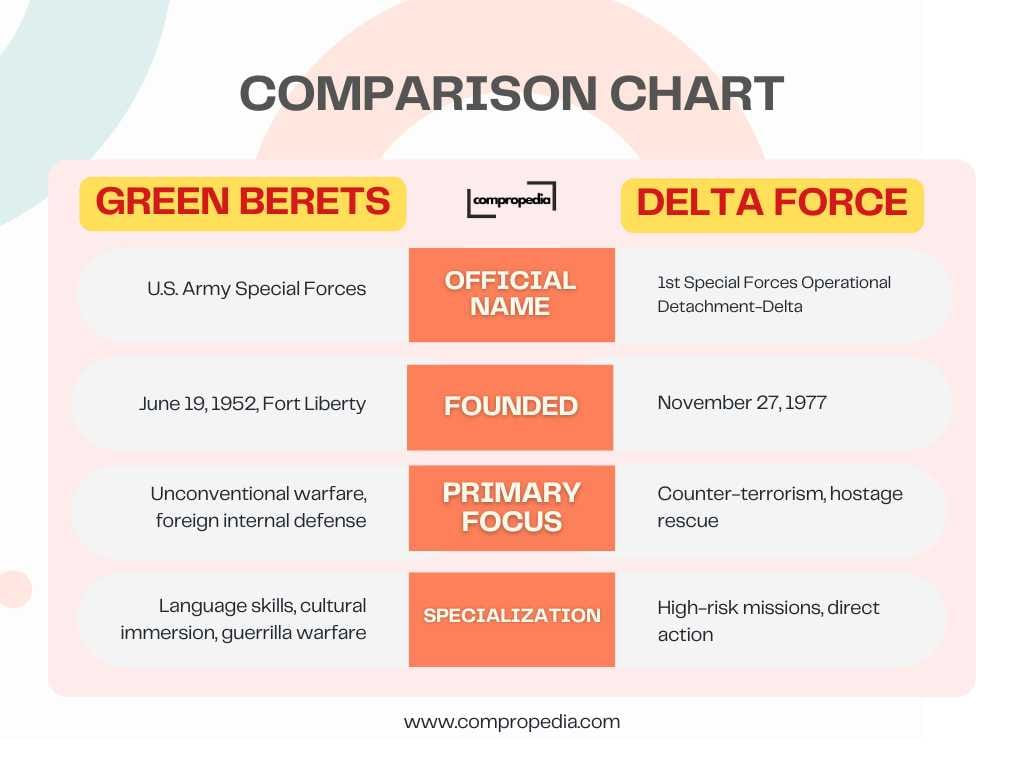I first became interested in the different types of U.S. special operations troops when I talked to a retired Green Beret at a family event. It was fascinating to hear about how he trained foreign allies and led missions in harsh, faraway places. Soon after, I met a former Delta Force operator who told me about a whole different side of special operations. He said it was full of dangerous, close-quarters missions and high-stakes counterterrorism efforts. These events made me think about the different jobs that the Green Berets and Delta Force have and how they work in ways that are both different and the same. It made me curious, so I looked into the differences between these two famous units more, which I’m excited to share with you now.
Overview
The Green Berets, officially known as the U.S. Army Special Forces, were established in 1952 and are recognized for their unconventional warfare skills. Delta Force (1st Special Forces Operational Detachment-Delta) was created in 1977 and specializes in counter-terrorism and hostage rescue. Both forces are renowned for their capabilities and dedication to defending the United States, but their roles and responsibilities differ significantly.

What does each unit specialize in?
Green Berets focus on unconventional warfare, which includes supporting friendly forces in foreign countries, guerrilla tactics, and training allied troops. Green Berets often operate in regions where diplomatic relationships are complex, and their mission is to empower allied forces to achieve strategic objectives.
Delta Force, by contrast, has a primary mission of counter-terrorism and direct-action operations. Delta Force operators are often deployed to capture or eliminate high-value targets, free hostages, and respond to immediate threats. Delta Force specializes in covert missions, often carrying out operations that require intense precision and stealth.
| Mission Aspect | Green Berets | Delta Force |
|---|---|---|
| Primary Mission | Unconventional warfare, foreign internal defense | Counter-terrorism, direct action |
| Operations Focus | Guerrilla tactics, building allied forces | Hostage rescue, high-value target missions |
| Common Locations | Conflict zones, remote areas | Anywhere with high-value targets |
Training & Selection Process
Green Beret Selection
Becoming a Green Beret requires passing the Special Forces Assessment and Selection (SFAS), which is followed by the Special Forces Qualification Course (SFQC). Green Beret candidates train for unconventional warfare, language skills, and cultural immersion. The entire process can take up to two years, and only a small percentage of those who start the SFAS ultimately complete the SFQC.
Delta Force Selection
Delta Force candidates are selected from other elite military units, such as the Green Berets or Rangers. The Delta selection process is highly secretive, but it includes a combination of intense physical endurance testing, land navigation, and psychological assessments. Those who pass the selection phase undergo Operator Training Course (OTC), which includes marksmanship, demolition, and counter-terrorism techniques.
| Training Aspect | Green Berets | Delta Force |
|---|---|---|
| Initial Selection | Special Forces Assessment and Selection (SFAS) | Recruitment from elite units, intense selection |
| Training Course | Special Forces Qualification Course (SFQC) | Operator Training Course (OTC) |
| Skill Focus | Unconventional warfare, language, cultural skills | Counter-terrorism, marksmanship, explosives |
| Duration | Up to 2 years | Highly variable, with continuous training |
Weapons
Green Beret Weapons and Gear
Green Berets use a range of weapons, tailored to each mission. Typical firearms include M4 Carbines, MK17 SCAR-H rifles, and M24 sniper rifles. Green Berets are also equipped with communications equipment, medical supplies, and survival gear to sustain long-term operations.
Delta Force Weapons and Gear

Delta Force operators have access to highly specialized weaponry and often customize their gear to suit specific missions. Common weapons include the HK416, M4A1, and specialized handguns like the Sig Sauer P320. Delta Force is also known for advanced night vision and surveillance equipment.
| Aspect | Green Berets | Delta Force |
|---|---|---|
| Primary Weapons | M4 Carbine, MK17 SCAR-H, M24 Sniper Rifle | HK416, M4A1, Sig Sauer P320 |
| Special Gear | Survival gear, medical kits, comms equipment | Advanced surveillance, night vision |
| Purpose | Sustained missions, long-term operations | High-intensity, short-duration operations |
Salary Comparison
Both Green Berets and Delta Force receive additional pay for their specialized roles, including hazard pay, special duty pay, and jump pay. While Delta Force operators may receive slightly higher pay due to the increased risk and secrecy of their missions, both forces earn above-average military compensation.
| Pay and Benefits | Green Berets | Delta Force |
|---|---|---|
| Base Salary | Based on rank and experience | Based on rank and experience |
| Special Duty Pay | Yes | Yes, often higher |
| Additional Benefits | Hazard pay, jump pay, medical, pension | Hazard pay, covert operation benefits |
Deployment
Green Berets typically deploy in 12-man teams, which can include specialists in medicine, engineering, and communication. These teams operate autonomously for long periods and are deployed worldwide to support allied forces.
Delta Force, in contrast, operates in small, highly trained units tailored for immediate response. Delta operators often face more frequent deployments, sometimes on missions that last only hours or days.
| Aspect | Green Berets | Delta Force |
|---|---|---|
| Deployment | 12-man teams, long-term missions | Small units, short-duration missions |
| Career Path | Opportunities for advancement | Highly selective, limited positions |
| Primary Deployments | Global, often in support roles | Global, direct action assignments |
Green Beret vs Delta Force FAQs
1. Who undergoes more training, Green Berets or Delta Force?
Delta Force training is typically more intense and shorter in duration than Green Beret training but is continually updated with rigorous specialized training courses.
2. Are Green Berets or Delta Force more dangerous?
Both forces are extremely skilled, but Delta Force’s role in high-stakes counter-terrorism makes it riskier in terms of the types of missions undertaken.
3. Can Green Berets join Delta Force?
Yes, many Delta Force candidates are recruited from Green Beret units, Rangers, and other special operations forces.
Which one is more elite?
Talking to people who used to be in both the Green Berets and the Delta Force made me appreciate what each unit does, even more. The Green Beret I talked to spoke about the personal ties and cultural understanding that come with teaching foreign forces. I now know that the goal of each unit shows a different part of the U.S. military plan. Each unit’s contribution is invaluable to U.S. national security, and each plays a critical role in maintaining global stability.







